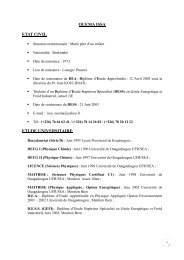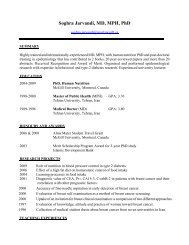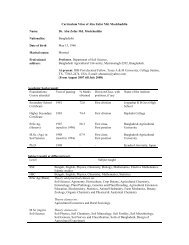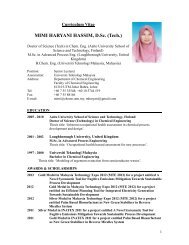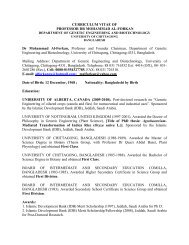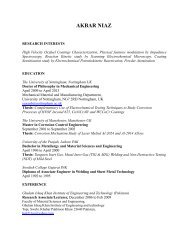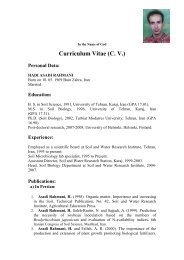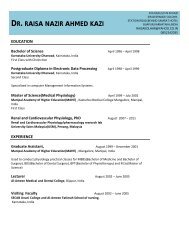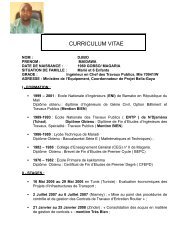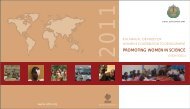Engineering: issues, challenges and opportunities for development ...
Engineering: issues, challenges and opportunities for development ...
Engineering: issues, challenges and opportunities for development ...
Create successful ePaper yourself
Turn your PDF publications into a flip-book with our unique Google optimized e-Paper software.
ENGINEERING CAPACITY: EDUCATION, TRAINING AND MOBILITYissue of widespread poverty in the African continent has beenobserved by UNESCO (2005) 82 <strong>and</strong>, according to Daly (2002), 83the research system should find solutions <strong>and</strong> exploit <strong>opportunities</strong><strong>for</strong> economic <strong>development</strong>. The research institutes arerecommended to devise strategies <strong>for</strong> research <strong>and</strong> to developthe skills needed to identify, analyse <strong>and</strong> address these crucial84 85specific problems (King, 2005; Hazell <strong>and</strong> Haddad, 2001).The Government of Botswana expects public research institutesto participate <strong>and</strong> make a positive impact in national<strong>development</strong>. The Botswana Technology Centre (BOTEC) isone of the public research institutes that is expected to contributeto the improvement of living st<strong>and</strong>ards of the peopleof Botswana.BOTEC undertakes R&D in science, engineering <strong>and</strong> technology,<strong>and</strong> its projects have mainly been in renewable energy,civil engineering <strong>and</strong> in<strong>for</strong>mation communications technologies.BOTEC was established in 1979 with the m<strong>and</strong>ateto promote science <strong>and</strong> technology through R&D, the transferof technology, policy <strong>development</strong>, support to industry,economic analysis, <strong>and</strong> in<strong>for</strong>mation <strong>and</strong> education activities.These ef<strong>for</strong>ts are aimed at improving the quality of life of thecitizens of Botswana, <strong>and</strong> supporting the economic <strong>development</strong>of the country.While other research institutes are m<strong>and</strong>ated to focus onagricultural production <strong>for</strong> food self-sufficiency, such as theDepartment of Agricultural Research, BOTEC concentrates onother technologies that are not necessarily food-related butprovide a general uplift of living st<strong>and</strong>ards. The projects belowrefer to solar renewable energy technologies, civil engineering<strong>and</strong> ICT.Centralized photovoltaic power stationThe centralized solar photovoltaic (PV) power station developedin 1998 was a demonstration pilot project to showcaseits feasibility in a remote rural village that is not connected tothe national electricity grid. The solar powered station has thecapacity to produce 5.7 kilowatts of electric power to provideelectricity (220V AC) in the village clinic, primary school, streetlights <strong>and</strong> households. The engineering element of this powerstation involved the applied research to adapt the photovoltaicsystem to Botswana conditions <strong>and</strong> to produce clean energy.82 UNESCO. 2005. UNESCO Science Report: Africa, authored by Jacques Gaillard,Mohamed Hassan <strong>and</strong> Rol<strong>and</strong> Waast in collaboration with Daniel Schaffer. UNESCO,Paris, France. Available at: www.iocd.org/PDF/unesco_sci_report05.pdf (Accessed: 28May 2010).83 Daly, John, A. 2002. Building Science <strong>and</strong> Technology Capacity in Developing Countries,Sustainable Development International, February 2002.84 King, K. 2005. The Commission <strong>for</strong> Africa: a changing l<strong>and</strong>scape <strong>for</strong> higher education<strong>and</strong> capacity <strong>development</strong> in Africa? Centre of African Studies, University of Edinburgh.Available at: www.nuffic.nl/pdf/os/em/king.pdf (Accessed: 28 May 2010).85 Hazell, P., <strong>and</strong> Haddad, L. 2001. Agricultural Research <strong>and</strong> Poverty Reduction, paper <strong>for</strong>the International Food Policy Research Institute, Washington, USA, August 2001. Availableat: http://EconPapers.repec.org/RePEc:fpr:2020dp:34© BOTEC Internal Technical ReportsSpecifically, the objectives <strong>for</strong> the design of the pilot PV powerstation project <strong>and</strong> electricity cabling to residential houses inthe village of Motshegaletau were to design a centralized photovoltaicpower system that would be capable of adequatelygenerating (220V AC) power that could be used <strong>for</strong> basic electricityneeds by the local community as well as a number ofinstitutional households <strong>and</strong> facilities. The basic <strong>and</strong> essentialelectricity needs to be provided include:■■■■■Basic lighting <strong>for</strong> households <strong>and</strong> other establishments.Electric power <strong>for</strong> household appliances such as radios aswell as refrigerators <strong>and</strong> television sets, <strong>for</strong> those able toaf<strong>for</strong>d them.Electric power <strong>for</strong> business <strong>and</strong> entertainment establishments.Electric power <strong>for</strong> essential government institutions such asschools <strong>and</strong> clinics.Cold storage facility to be used as a mortuary.In addition the PV power station would:■ Demonstrate <strong>and</strong> encourage energy conservation throughthe use of energy efficient appliances without compromisingon the quality of the service rendered, such as the use ofenergy efficient lights.■■■■Enhance the awareness <strong>and</strong> acceptance by the general publicas well as appeal to the government <strong>and</strong> local authorities<strong>for</strong> the use of photovoltaic electric power systems as analternative (where grid power is not viable).Contribute towards an increased exploitation of the abundantsolar energy <strong>and</strong> its subsequent environmental <strong>and</strong>socio-economic benefits to the nation.Help BOTEC build local expertise in the area of the designof photovoltaic electric power systems <strong>for</strong> rural village electrification.Enable the design team to determine comprehensively theper<strong>for</strong>mance of the PV power station (through a data monitoring<strong>and</strong> analysis process). PV power station pilot project.353



